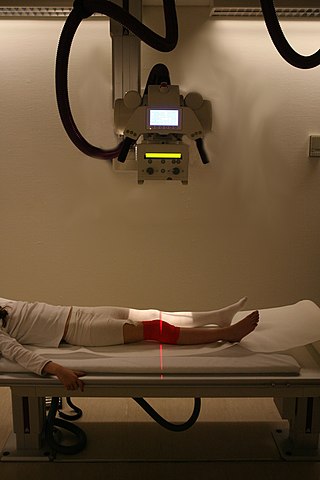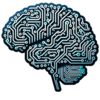
The Diagnostic and Statistical Manual of Mental Disorders is a publication by the American Psychiatric Association (APA) for the classification of mental disorders using a common language and standard criteria. It is the main book for the diagnosis and treatment of mental disorders in the United States and Australia, while in other countries it may be used in conjunction with other documents. The DSM-5 is considered one of the principal guides of psychiatry, along with the International Classification of Diseases (ICD), Chinese Classification of Mental Disorders (CCMD), and the Psychodynamic Diagnostic Manual. However, not all providers rely on the DSM-5 as a guide, since the ICD's mental disorder diagnoses are used around the world and scientific studies often measure changes in symptom scale scores rather than changes in DSM-5 criteria to determine the real-world effects of mental health interventions.

A chatbot is a software application or web interface that is designed to mimic human conversation through text or voice interactions. Modern chatbots are typically online and use generative artificial intelligence systems that are capable of maintaining a conversation with a user in natural language and simulating the way a human would behave as a conversational partner. Such chatbots often use deep learning and natural language processing, but simpler chatbots have existed for decades.
Schizoaffective disorder is a mental disorder characterized by abnormal thought processes and an unstable mood. This diagnosis requires symptoms of both schizophrenia and a mood disorder: either bipolar disorder or depression. The main criterion is the presence of psychotic symptoms for at least two weeks without any mood symptoms. Schizoaffective disorder can often be misdiagnosed when the correct diagnosis may be psychotic depression, bipolar I disorder, schizophreniform disorder, or schizophrenia. This is a problem as treatment and prognosis differ greatly for most of these diagnoses.
Adjustment disorder is a maladaptive response to a psychosocial stressor. It is classified as a mental disorder. The maladaptive response usually involves otherwise normal emotional and behavioral reactions that manifest more intensely than usual, causing marked distress, preoccupation with the stressor and its consequences, and functional impairment.
A clinical decision support system (CDSS) is a health information technology that provides clinicians, staff, patients, and other individuals with knowledge and person-specific information to help health and health care. CDSS encompasses a variety of tools to enhance decision-making in the clinical workflow. These tools include computerized alerts and reminders to care providers and patients, clinical guidelines, condition-specific order sets, focused patient data reports and summaries, documentation templates, diagnostic support, and contextually relevant reference information, among other tools. CDSSs constitute a major topic in artificial intelligence in medicine.

Personalized medicine, also referred to as precision medicine, is a medical model that separates people into different groups—with medical decisions, practices, interventions and/or products being tailored to the individual patient based on their predicted response or risk of disease. The terms personalized medicine, precision medicine, stratified medicine and P4 medicine are used interchangeably to describe this concept, though some authors and organizations differentiate between these expressions based on particular nuances. P4 is short for "predictive, preventive, personalized and participatory".
Health technology is defined by the World Health Organization as the "application of organized knowledge and skills in the form of devices, medicines, vaccines, procedures, and systems developed to solve a health problem and improve quality of lives". This includes pharmaceuticals, devices, procedures, and organizational systems used in the healthcare industry, as well as computer-supported information systems. In the United States, these technologies involve standardized physical objects, as well as traditional and designed social means and methods to treat or care for patients.
Self-diagnosis is the process of diagnosing, or identifying, medical conditions in oneself. It may be assisted by medical dictionaries, books, resources on the Internet, past personal experiences, or recognizing symptoms or medical signs of a condition that a family member previously had or currently has.
Disease Informatics (also infectious disease informatics) studies the knowledge production, sharing, modeling, and management of infectious diseases. It became a more studied field as a by-product of the rapid increases in the amount of biomedical and clinical data widely available, and to meet the demands for useful data analyses of such data.
Child and adolescent psychiatry is a branch of psychiatry that focuses on the diagnosis, treatment, and prevention of mental disorders in children, adolescents, and their families. It investigates the biopsychosocial factors that influence the development and course of psychiatric disorders and treatment responses to various interventions. Child and adolescent psychiatrists primarily use psychotherapy and/or medication to treat mental disorders in the pediatric population.
Imaging informatics, also known as radiology informatics or medical imaging informatics, is a subspecialty of biomedical informatics that aims to improve the efficiency, accuracy, usability and reliability of medical imaging services within the healthcare enterprise. It is devoted to the study of how information about and contained within medical images is retrieved, analyzed, enhanced, and exchanged throughout the medical enterprise.
Artificial intelligence (AI) has been used in applications throughout industry and academia. Similar to electricity or computers, AI serves as a general-purpose technology that has numerous applications. Its applications span language translation, image recognition, decision-making, credit scoring, e-commerce and various other domains. AI which accommodates such technologies as machines being equipped perceive, understand, act and learning a scientific discipline.

Psychiatry is the medical specialty devoted to the diagnosis, prevention, and treatment of deleterious mental conditions. These include various matters related to mood, behaviour, cognition, perceptions, and emotions.

Medical diagnosis is the process of determining which disease or condition explains a person's symptoms and signs. It is most often referred to as a diagnosis with the medical context being implicit. The information required for a diagnosis is typically collected from a history and physical examination of the person seeking medical care. Often, one or more diagnostic procedures, such as medical tests, are also done during the process. Sometimes the posthumous diagnosis is considered a kind of medical diagnosis.
The use of electronic and communication technologies as a therapeutic aid to healthcare practices is commonly referred to as telemedicine or eHealth. The use of such technologies as a supplement to mainstream therapies for mental disorders is an emerging mental health treatment field which, it is argued, could improve the accessibility, effectiveness and affordability of mental health care. Mental health technologies used by professionals as an adjunct to mainstream clinical practices include email, SMS, virtual reality, computer programs, blogs, social networks, the telephone, video conferencing, computer games, instant messaging and podcasts.
Psychiatry is, and has historically been, viewed as controversial by those under its care, as well as sociologists and psychiatrists themselves. There are a variety of reasons cited for this controversy, including the subjectivity of diagnosis, the use of diagnosis and treatment for social and political control including detaining citizens and treating them without consent, the side effects of treatments such as electroconvulsive therapy, antipsychotics and historical procedures like the lobotomy and other forms of psychosurgery or insulin shock therapy, and the history of racism within the profession in the United States.

Artificial intelligence in healthcare is the application of artificial intelligence (AI) to copy human cognition in the analysis, presentation, and understanding of complex medical and health care data, or to exceed human capabilities by providing new ways to diagnose, treat, or prevent disease. Specifically, AI is the ability of computer algorithms to arrive at approximate conclusions based solely on input data.

Ada Health was founded in 2011, through the collaboration of Dr. Claire Novorol, Professor Martin Hirsch, and Daniel Nathrath.

Merative L.P., formerly IBM Watson Health, is an American medical technology company that provides products and services that help clients facilitate medical research, clinical research, real world evidence, and healthcare services, through the use of artificial intelligence, data analytics, cloud computing, and other advanced information technology. Merative is owned by Francisco Partners, an American private equity firm headquartered in San Francisco, California. In 2022, IBM divested and spun-off their Watson Health division into Merative. As of 2023, it remains a standalone company headquartered in Ann Arbor with innovation centers in Hyderabad, Bengaluru, and Chennai.

Edward Y. Chang is a computer scientist, academic, and author. He is an adjunct professor of Computer Science at Stanford University, and Visiting Chair Professor of Bioinformatics and Medical Engineering at Asia University, since 2019.









